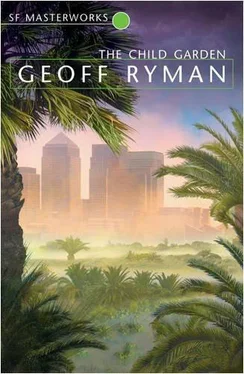It was summer, and there, beyond the old sashcord windows, was her tree.
The tree seemed to greet her every morning. It was very tall, but its long branches were delicate and hung airily down, almost like curtains, its leaves dappled into many colours by the sun. Its trunk was mottled; sections of its bark fell off like pieces of a puzzle. Milena knew its Latin name because she loved the tree: ailanthus altissima. The Chinese called it the Tree of Heaven.
Already it was hot. Sunlight streamed through the window. Behind her there was a sound of someone stirring. Milena turned. The two girls Milena shared the room with, Suze and Hanna, were still asleep. Their faces were as drained of personality as rice pudding. One of them had turned in her bed. They would be up soon. Milena wanted to avoid them.
She pulled back her quilt as quietly as possible and sat up. There was her old room. There were the orange walls; there were the old chipped skirting boards, lumpy with layers of paint. There was the fireplace that no longer fed into a chimney; there were the black urns of the charcoal heaters.
Milena the child did not want to move. Her eyes felt swollen and dusty. She had been reading most of the night. She wanted to fall back into the bed and sleep; but if she did that she would be trapped, with the others. As a kind of compromise, she reached for her book. If the others started to move, she would still be awake and could escape.
The book was a biography of Einstein. A few days before, Milena had heard other children talking about him. The ache had come over her: something else she didn’t know. So she had gone to the Museum and found this book. She opened it up and looked at the photographs. She saw a photograph of Einstein as a child. He already had a slight, amused smile. Beidermeir, the other children had called him — honest, clumsy furniture — because he always said exactly what he thought to his teachers. At sixteen, he pretended to have a nervous breakdown, to get out of Germany.
Suze groaned in her bed and turned away from the sunlight. Milena stood up, and pulled on her jumpsuit that had been laid out flat on the floor. Everything was arranged for a quick escape in the mornings. She pulled on her black slippers, and slipped out of the apartment. The apartment had three large rooms and slept nine girls. There was a blackboard in the front hall. A work rota was written on it: names in English, tasks in Chinese. Milena’s name was not on it. Milena was regarded as disabled, and exempt from tasks.
Milena went down to breakfast without washing first. She was famous for not washing, and was commonly supposed to smell. From the adenoidal way the other children sometimes talked to her, she knew they held their breath when she was near. But there was only one bath in the apartment for nine children. If Milena washed when they did, she would have to stand in line with them and try to think of things to say. Anything she said seemed to reveal the blankness of her memory, how little she knew.
Milena trudged down the steps, all the way to the basement. The other children used the front door of their stairway and walked to breakfast in sunlight. Milena walked the length of the building at its lowest level. Milena liked it there. The old mansion block had been built two hundred and fifty years before around a series of light wells. The light wells were tiled and streaked and looked somewhat lavatorial, but there was blue sky at their summit. Light was shed seven storeys down through the honeycomb of pipes and lift shafts. It was like a hidden city. The Senior kept his bee hives on the roof. Milena could see the bees overhead, plump black dots humming in the air, rising and falling. They were working. Milena liked their faithfulness.
The light wells and the roof were supposed to be out of bounds. The children raided the hives for honey, and ran screaming through the basement at night, playing hide and seek. They burst into the Nurses’ rooms, which lined the lower floor, and ran laughing as the Nurses chased them. The Nurses would be thirteen or fourteen years old. They laughed too. It was then, at night, when the other children played, that Milena could read, alone in the room.
Milena walked on and tried to remember what she had read the night before. She had been charmed to find that Einstein’s first wife had been called Mileva. They had lived together in Berne when he was a civil servant. He had forgotten the key to their apartment on the day of their wedding. Mileva was from Czechoslovakia, like Milena.
Wasn’t she? Czechoslovakian? Milena suddenly wasn’t sure. She was dismayed that she could not remember the nationality of Einstein’s first wife. Why can’t I learn? she wondered, scuffing her feet. She was a freak; she knew she was a freak; everyone treated her like a freak. The viruses buffeted her like a hurricane, but left nothing behind. She read books and they seemed to evaporate. Milena was very discouraged.
She pushed open another door, and walked up more steps, to the Hall.
The Hall was full of folding bamboo tables. They had flat, grey resin tops to make them easier to clean. On sunny days, the whole room smelled of pine. The work shift was still laying spoons and cups for breakfast, solemn, puffy-eyed children of eight or nine, moving with the mindless motions of machinery, dazed with sleepiness, driven by training.
A Nurse was serving lentil porridge. ‘Good morning, Ms Shibush,’ the Nurse said to Milena. The Nurse was older than most: about eighteen years. Milena knew her name but didn’t use it.
‘Lo,’ murmured Milena grumpily, without any other greeting.
The Nurse looked at Milena, unwashed, impolite, and dazed by hard work of which the other children — indeed the Nurse herself — had no experience. The Nurse shook her head. All the staff were giving up on Milena. They had stopped praying for her, they said. Milena was beginning to give up on herself. She could not read enough, or study enough, or memorise enough or think enough to keep up with the others. Milena made kindly children doe-eyed with pity; cruel children were afraid of her. It was part of Milena’s affliction that she was able to hit people.
Milena took her lentil porridge to an empty table. Some Tykes sat at another table. Wee Lambs. Billy Dan and his little gang of five year olds. Milena could hear them playing games.
‘OK,’ said Billy. ‘What’s this?’ And he recited:
‘Besides with justice this discerning age
Admires their wond’rous talents for the stage:
Well may they venture on the mimick’s art,
Who play from morn to night a borrowed part
And the other Tykes cried out the answer: ‘Johnson, Samuel Johnson!’
‘London. That’s the title. "London: A Poem.’"
And Billy tried to look superior. ‘Written in imitation of…’ He was not allowed to finish.
‘The Third Satire of Juvenal!’
It was a pointless game. Everyone had the same viruses, but the Wee Lambs were still impressed by the knowledge that basked like whales inside their heads. The Wee Lambs were insufferable. They would put wood chips or dried peas in people’s beds for fun and then weep themselves to sleep. They needed taking care of. The older children did their washing and ironing for them. The Wee Lambs would lord it over them, or try to prove they knew more than the older children. Just a phase, the older children said, wrinkling their noses with the disdain of those who were nearly adult. The older children admired practical skills. They prided themselves on the stalls they ran, on the deals they drove, buying or selling lumber or crystal or plaster or eggs. They compared each of the Estates, eyeing up their possible futures. Would it be better to stay a Restorer or become a Reefer, growing new buildings instead of repairing old ones? What about Farming? Nice outdoor life, with plenty of razzle — off-duty work — on the side. What about Resins or Hides or even Pharmacy? Doctors were the highest, Doctors were the best, but no one expected to be Placed as a Doctor.
Читать дальше












